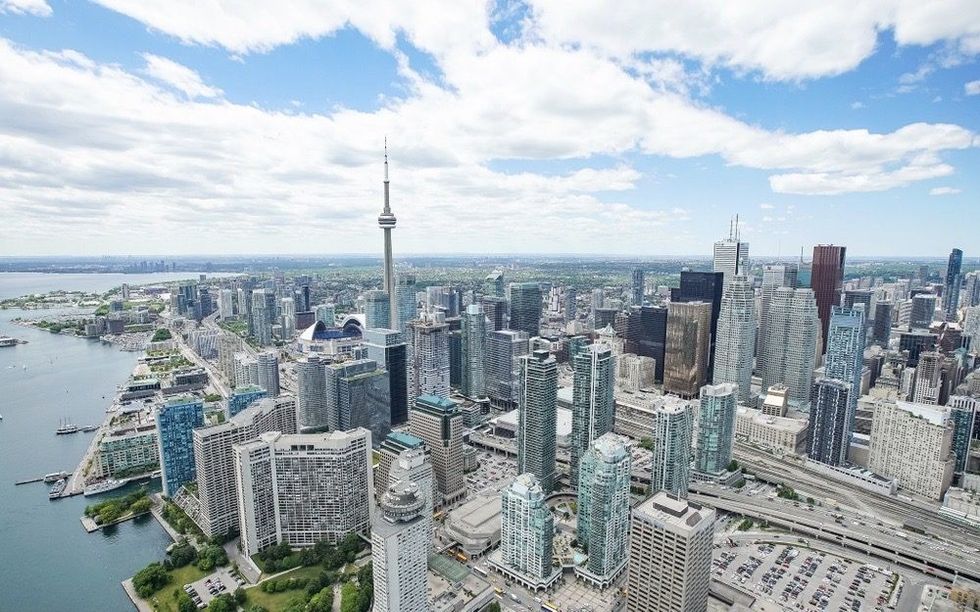The federal Liberal government has closed the door to foreign homebuyers for two years -- and the move has left industry experts shaking their heads.
As CTV broke yesterday, the Liberal’s 2022 budget allegedly includes a commitment to make it illegal for foreigners to buy any residential properties in Canada for the next two years. The ban will include all home types, from condos to single-detached houses. There are some exceptions, however; the ban will not extend to foreign nationals purchasing a primary residence in Canada, permanent workers, foreign workers, and students.
The dramatic move, touted as a means to cool Canada’s red-hot and increasingly unattainable housing market, quickly made news headlines. But industry experts aren’t entirely surprised (it was promised during campaign time, after all). Nor do they think the ban will result in a notable difference when it comes to cooling the market. In fact, they say that foreign buyers aren't the problem to begin with.
“The ban is not entirely a surprise; they have been talking about taking more aggressive steps against foreign buyers,” says Nasma Ali, founder and broker at Toronto’s One Group realty. “And foreign buyers are the easy scapegoats and targets in housing because they have zero voting power.”

For the Optics
Mortgage expert Dustan Woodhouse says that targeting foreign homebuyers isn't an unexpected strategy because the concept of a foreign buyer ban plays well optically for concerned Canadians. “It is unfortunate though, because few understand the actual implications,” says Woodhouse. “Meaning, few understand who the ‘foreign buyers’ actually are and what role they are playing in our economy and the fabric of Canadian society.”
Woodhouse points to the fact that “nearly all of our parents, grandparents, or great-grandparents -- whoever was first in the family to arrive” were foreign homebuyers. “Most sorted out a home base as the first step of arriving in a new country. They perhaps had pets; perhaps kids. They all wanted stability,” he says. “So, they bought. Got jobs. Got Credit. Paid taxes and contributed. Then, over the next few years as they settled in, pursued permanent resident status or Canadian citizenship.”
Elke Rubach, Principal, Rubach Wealth, worries about the impact on what the ban can mean for immigration and how it will be enforced. "There's a vast need for immigration to support Canada’s economic growth, and highly qualified newcomers will need a place to live, so it will be important to distinguish between absentee landlords and actual contributors to the economy," says Rubach. "Canada is perceived as a welcoming country internationally. We are. We want foreign money. Enforcing this new ban may prove to be costly and yield marginal effects."
Woodhouse points to 2020 and 2021 as evidence of how small a role foreign buyer transactions actually play in the Canadian housing market. “We had near zero foreign buyer activity,” he says. “So how can the Feds suggest foreign buyers are the problem? Well, because it looks good on the nightly news. If the typical Canadian walked door-to-door twenty houses either side of their own they would find zero foreign buyers. They may find New Canadians -- which is a good thing -- but not foreign buyers.”
Like Woodhouse, Ali also says that foreign homebuyers have never actually been a large proportion of Canadian purchasers in the first place. “It is negligible,” she says. “Yes, we have foreign money sometimes, but the buyers are usually citizens, or have permanent residency. And we forget that they can still be gifted foreign money. You can let your imagination run on that one.”

According to Gavin Swartzman, CEO of Peerage Realty Partners, the proof that foreign buyers aren’t the issue is found in loud-and-clear data. “Data gathered by our partners, Baker Real Estate, shows that foreign buyers account for less than one of every 20 of Baker’s condo sales in Toronto and Montreal,” says Swartzman. “Let’s remember that the assets they do own become part of the urban rental housing stock; historically, foreign buyers have played an important role in the domestic housing ecosystem by purchasing condo units, accepting the related risks and long timelines, and then renting them out.”
Like Woodhouse, Swartzman points to optics on the part of the federal government.
‘This is hardly the market dominating distortion the politicians would have Canadians believe. Even the CMHC has described that the share of non-resident ownership in condominium apartments remains low and stable,” says Swartzman. “Of 39,000 new condo sales by Baker over the past decade, 96.7% (or 37,585) purchasers were residents of Canada. Looking at the real estate market in its totality, a 2019 CMHC report determined that properties with at least one non-resident owner represented just 6.2% of the BC market, 3.3% of the Ontario market, and 6.2% of Nova Scotia’s market.”
Swartzman also highlights that both China and India -- countries of origin for many newcomers and investors alike -- have toughened their capital export rules, making it more difficult to get money out of those countries.

Other Factors Having a Bigger Impact
Rather than punishing foreign buyers, Ali points to other measures as having more of an impact in cooling the market -- which has recently actually showed signs of dialling back the drama -- and the record-breaking home prices we saw play out over the past two years.
“This measure will not have more of an impact that already is happening and that we are seeing. The rate hike announcements have punched our market, and buyer sentiment is already changing,” says Ali. “Let's see if we withstand more punches like more rate hikes.”
At the end of the day, the reality remains that Canada has a relentless supply issue. The bottom line is that we need more of it. And quickly.
“Demand side economics did not work -- for example, Mr. Siddall’s fruitless efforts and pointless programs -- and protectionism will not fix the issue either,” says Woodhouse. “The real issue is that real estate supply is largely the domain of the municipal governments, that’s who controls the flow -- and they cannot get staffed, aligned, or assistance from the other levels of government. So, the march will continue.”
In Ontario, Premier Doug Ford has a strong mission to tackle the supply issue. Last month, a bill tabled by Municipal Affairs and Housing Minister Steve Clark aims to address lengthy city planning approvals that can slow down home construction. The bill proposes several changes to the provincial Planning Act and City of Toronto act; namely, speeding the housing development and rezoning approval process in municipalities by reducing the development fees a city receives if decisions are not made within certain timeframes, with a full fee refund after 120 days.
While the bill has been met with mixed reaction, it also undeniably symbolizes progress in getting to the root of the supply issue.
But Rubach also suggests that banks and the government could play a more proactive role in not only providing secure access to homeownership, but in providing financial education to Canadians. "This way, people (especially women) can be empowered, no matter what level of income they are at, to own their finances and develop their own path to successful ownership," she says.
Rubach points to opportunities to leverage models similar to the Habitat for Humanity model, where families partner with a lender and learn to manage their finances to afford their home.
"Habitat homeowners spend no more than 32% of household income on housing, which provides stability and the chance to build a secure future for themselves and their children. The organization provides families with the coaching, education, and support to be successful first-time homeowners," says Rubach. "We’re also seeing more and more rent-to-own services that are closing the gap to homeownership by partnering with potential first-time homeowners and allowing them to access ownership without the need to pay the astronomical down payment in one fell sweep."
Naturally, the federal budget -- which will be officially unveiled today at 4pm -- includes other measures to tackle housing affordability too. Notably, we will see the introduction of a “Tax-free First Home Savings Account” that’s intended to help first-time homebuyers under the age of 40 in Canada save up to $40K toward their first purchase. In total, the entirety of the budget dedicated to housing initiatives over the next five years is presumed to be in the $10B range.
But when it comes to the foreign buyer ban, the consensus is clearly that it misses the mark.





















